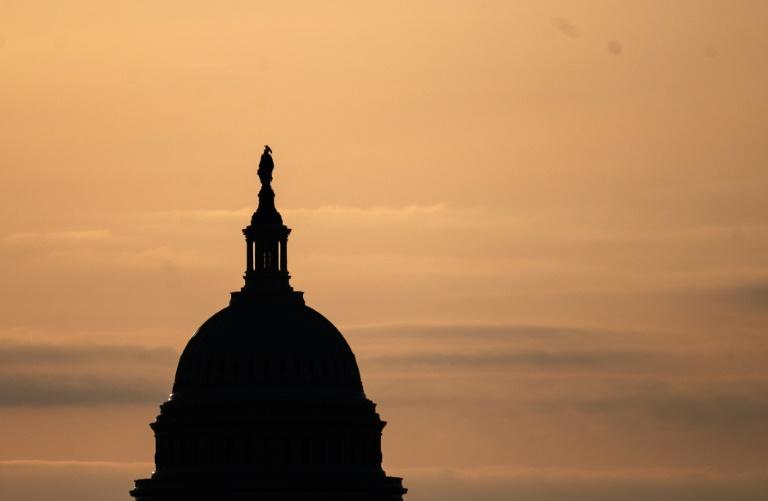
WASHINGTON, Sept 19, 2021 (BSS/AFP) - US lawmakers will dive into the
busiest legislative period in years in the coming week, with President Joe
Biden counting on a united front from Democrats to pass make-or-break
spending bills that he hopes will improve his sagging approval ratings.
Facing stinging criticism over the chaotic US withdrawal from Afghanistan
and a stubbornly elevated pandemic death toll, Biden is banking on going into
next year's midterm elections with historic economic reforms under his belt.
Avoiding a government shutdown is also at the top of the agenda, alongside
dodging a catastrophic credit default, which may be the largest of the
looming deadlines.
- Build Back Better -
Democrats are hoping to secure a sweeping $3.5 trillion social policy
package through a process known as reconciliation, meaning the bill can pass
with a simple majority in the evenly divided 100-member Senate.
Without reconciliation, 60 votes would be needed in a procedural vote just
to advance the legislation, which would require support from 10 Republicans.
The so-called "Build Back Better" package aims to tackle climate change,
lower child care and education costs for working families, and create
millions of jobs.
Biden said in a speech Thursday he was confident Congress would pass the
plan, characterizing it as a moment that could "change the trajectory of our
country for years or decades to come."
Republicans are unsurprisingly dismissing the proposals as an example of
out-of-control tax-and-spend politics, but the real battle is playing out
between moderate and progressive Democrats.
Worried about inflation and the national debt -- $28.8 trillion and rising
-- centrist Democratic senators Joe Manchin and Kyrsten Sinema oppose the
high ticket price, although Manchin has indicated he may be open to a $1.5
trillion package.
"We don't have the need to rush into this and get it done within one week
because there's some deadline we're meeting or someone's going to fall
through the cracks," Manchin, who represents West Virginia, told NBC.
Senate budget chairman Bernie Sanders, backed by Majority Leader Chuck
Schumer, has drawn his own red line, telling CNN that any bill that falls
below the $3.5 trillion total is "absolutely not acceptable to me."
Rebuffing misgivings about rising debt, House Democrats have circulated a
plan to pay for Build Back Better through nearly $3 trillion in new taxes,
mainly from wealthy Americans and corporations, on top of smaller reforms
such as tougher tax enforcement.
- Infrastructure -
A $1.2 trillion infrastructure bill passed the Senate in August with the
support of one-third of the 50 Republicans in addition to all 50 Democrats.
Democratic Speaker Nancy Pelosi promised a vote by September 27 in the
House of Representatives, where her party holds a razor-thin majority.
But here too, the real fight is internal, with Democratic progressives
saying they won't vote for it until the larger reconciliation package is
squared away.
Moderates won't vote for reconciliation without infrastructure, which they
say would be an easy win demonstrating Biden's self-professed talent in
bringing all sides together.
It is not clear how the debate will play out, but Hill watchers warn the
process could take weeks or even months to complete.
The infrastructure bill includes $500 billion in new federal spending on
roads, bridges, transportation, high-speed internet and climate change
measures including a network of charging stations for electric cars.
- Debt ceiling and shutdown -
The US debt ceiling must be suspended or raised soon in the coming weeks to
avoid a default, which would trigger economic collapse and a worldwide
financial meltdown.
Treasury Secretary Janet Yellen has warned of "irreparable damage to the US
economy" as soon as next month.
Democrats usually join with Republicans to suspend the debt limit and did
so most recently in August 2019, under Donald Trump's administration.
Lawmakers will have to approve a new budget before October 1 to avoid a
government shutdown -- when financing for federal agencies dries up and they
can no longer function.
Democrats are also looking at attaching disaster aid for wildfires and
floods to any legislation aimed at averting the shutdown, creating an
incentive for lawmakers in disaster-hit Republican states to play ball.
But Republicans are threatening to withhold their votes on any debt ceiling
package.
They argue that Schumer, Pelosi and the White House should have addressed
the debt limit in the Build Back Better package, because it doesn't require
Republican support.
Republicans have suggested that Biden's policies have created the need for
the debt limit increase.
An analysis of Treasury Department data shows however that Republicans
accrued $7.8 trillion in new debt during the Trump administration -- more
than a quarter of the total -- in just four years.
The country has added a fraction of that -- around $600 billion -- since
Biden's inauguration on January 20.